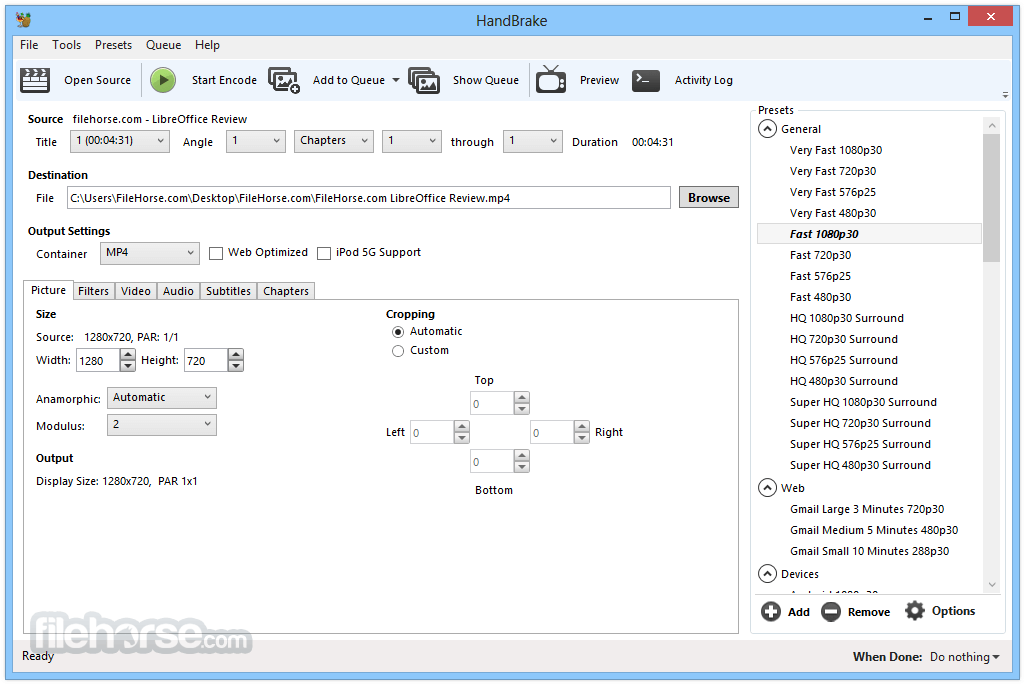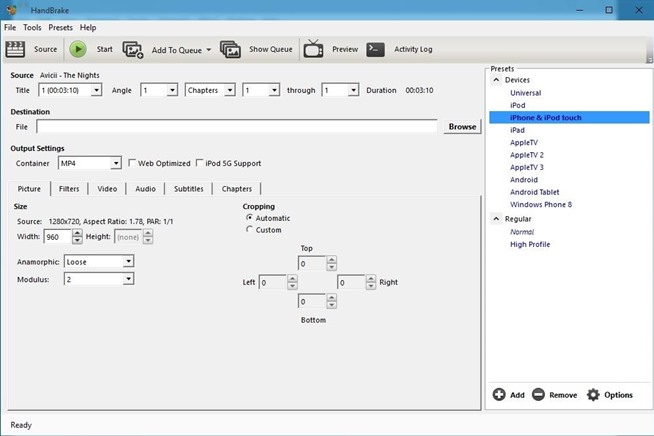HandBrake for Mac is a program that lets you convert multiple types of video files into MP4 or MKV format, while specifying other output characteristics, as well.
Hardware
Therefore, you will need to download Handbrake libdvdcss on Mac manually. #1 How to Download Libdvdcss for Handbrake on Mac using Homebrew. For Mac running on macOS later than 10.10 El Captain, users can use Homebrew to simplify the process of installing command line software like cask, htop, etc and open-source packages including libdvdcss on. Building HandBrake for Mac. Building HandBrake for Mac requires an Apple computer with a 64-bit Intel processor running OS X 10.10.5 Yosemite or later, and the following dependencies. Handbrake For Mac 10.10.5; Handbrake can’t meet your needs, here we introduce the excellent Handbrake Alternative for Mavericks to help you rip Blu-ray/DVD to MKV/AVI/MP4 without quality loss in Mac OS X Yosemite as well as Mavericks, even the new El Capitan. Handbrake is an excellent tool that allows you to take a movie and convert/compress.
The following is the minimum level of hardware that HandBrake formally supports.
- Processor:
- Intel Core (6th generation and newer) i3, i5, i7, i9 or equivalent Xeon
- AMD Ryzen, Threadripper or Epyc
- Free memory:
- 1 GB for transcoding standard definition video (480p/576p)
- 2 GB for transcoding high definition video (720p/1080p)
- 6 GB or more for transcoding ultra high definition video (2160p 4K)
- System storage:
- 150 MB for the HandBrake app
- 10 GB or more recommended for processing and storing your new videos
- Display resolution:
- 1024x768 minimum, proportionately higher with display scaling
While it may be technically possible to run HandBrake on hardware not meeting these requirements, it is not recommended.
Hardware encoders
Please see the specific documentation pages for these encoders for further details.
Software
The following describes the level of support available for the current HandBrake version as indicated by the status for each system version.
| Status | Description | Support Level | Maintenance |
|---|---|---|---|
| Supported | HandBrake is maintained and tested working on these system versions. | The HandBrake Team and community members provide volunteer support. | Issue reports are welcome and addressed based on team availability. |
| Deprecated | HandBrake might work on these system versions with limitations. | No support will be provided. | Most issues will likely not be addressed. Please update to enjoy the latest features and bug fixes. |
| Unsupported | HandBrake does not work or is severely limited on these system versions. | No support will be provided. | No issues will be addressed, regardless of severity. Updating as soon as possible is highly recommended. |
BSD and Linux
FreeBSD

HandBrake is supported on FreeBSD stable and maintenance versions.
| FreeBSD Version | Status | Last Compatible Version | Notes |
|---|---|---|---|
| FreeBSD 13 | Supported | ||
| FreeBSD 12 | Supported | ||
| FreeBSD 11 | Supported |
Fedora
HandBrake is supported on Fedora stable and maintenance versions until their end of life.
| Fedora Version | Status | Last Compatible Version | Notes |
|---|---|---|---|
| Fedora 34 | Supported | ||
| Fedora 33 | Supported | ||
| Fedora 32 | Deprecated in 1.3.0 | ||
| Fedora 31 | Deprecated in 1.3.0 | ||
| Fedora 30 | Deprecated in 1.3.0 | End of life. | |
| Fedora 29 | Unsupported | HandBrake 1.3.1 | End of life. |
| Fedora 28 | Unsupported | HandBrake 1.3.1 | End of life. |
Ubuntu
HandBrake is supported on the most recent Ubuntu LTS version until a new LTS version is released. Support for older LTS versions may be provided via Flatpak.
Interim (non-LTS) versions are typically supported until their end of life.
| Ubuntu Version | Status | Last Compatible Version | Notes |
|---|---|---|---|
| 20.04 LTS Focal Fossa | Supported | Flatpak, PPA, and source. | |
| 18.04 LTS Bionic Beaver | Deprecated in 1.3.0 | HandBrake 1.3.0 | Flatpak only. |
| 16.04 LTS Xenial Xerus | Unsupported | HandBrake 1.1.2 | Various issues affect operability. |
| 14.04 LTS Trusty Tahr | Unsupported | HandBrake 1.1.2 | End of life (standard support). |
Other
While no official support for other systems is provided, HandBrake’s Flatpak binaries are widely compatible, and documentation is provided for compiling from source on a variety of BSDs and Linux distributions. Hardware encoding support may be limited or unavailable on these systems.
See Where to get HandBrake, Building HandBrake for BSD, and Building HandBrake for Linux, for additional details.
Mac
Handbrake 10.10 Version
Since version 1.4.0 HandBrake for macOS is shipped as a Universal Binary 2 (x86_64 / arm64). HandBrake is supported on recent versions of macOS1.
| macOS Version | Status | Last Compatible Version | Notes |
|---|---|---|---|
| 11 Big Sur | Supported | Requires HandBrake 1.4 or later. | |
| 10.15 Catalina | Supported | Requires HandBrake 1.2.2 or later. | |
| 10.14 Mojave | Supported | Requires HandBrake 1.1.2 or later. | |
| 10.13 High Sierra | Deprecated | 1.4.0 | End of life |
| 10.12 Sierra | Deprecated | 1.4.x | End of life. |
| 10.11 El Capitan | Unsupported | 1.3.x | End of life. |
| 10.10 Yosemite | Unsupported | 1.1.2 | End of life. |
| 10.9 Mavericks | Unsupported | 1.1.2 | End of life. |
| 10.8 Mountain Lion | Unsupported | 1.1.2 | End of life. |
| 10.7 Lion | Unsupported | 1.1.2 | End of life. |
| 10.6 Snow Leopard | Unsupported | 0.10.5 | End of life. |
Handbrake Mac 10.10.5
VLC is recommended for viewing media files, notably Matroska (MKV), which is not natively supported on macOS.
Windows

HandBrake requires the .NET Desktop Runtime 5.0.x
| Windows Version | Status | Last Compatible Version | Notes |
|---|---|---|---|
| Windows 10 | Supported | 1909 or later | |
| Windows 8.1 | Unsupported | 1.3.3 | See Note Below |
| Windows 7 SP1 | Unsupported | 1.3.3 | See Note Below |
| Windows Vista | Unsupported | 1.0.7 | End of life. |
| Windows XP | Unsupported | 0.9.9 | End of life. |

Note: HandBrake will still run on Windows 7 and 8.1. You will receive a notice that it is not supported when starting the app (twice) after which it will continue to run normally.Please note, some functionality may not work correctly on these OSes.
VLC is recommended for viewing media files.

Display scaling
Handbrake 1.10
Display scaling beyond 100% requires a proportionately higher resolution to fit the higher density interface graphics in the same physical space. For example, HandBrake will fit within the bounds of a 1920x1080 (FHD) resolution display at 100% and 125% scaling, but not at 150% and higher.
Handbrake 10.10 Download
The following is a list of common display scales and corresponding standard resolutions that meet HandBrake’s requirements. Higher resolutions may also be used.
Handbrake 10.10 Mac
| Scaling | Minimum Height | 4:3 Aspect | 16:10 Wide Aspect | 16:9 Wide Aspect | 21:9 Ultrawide Aspect |
|---|---|---|---|---|---|
| 100% | 768 pixels | 1024x768 (XGA) | 1280x800 (WXGA), 1440x900 (WSXGA/WXGA+) | 1366x768 (WXGA), 1600x900 (HD+) | 2160x900 (WHD+) |
| 125% | 960 pixels | 1280x960 (SXGA−), 1400x1050 (SXGA+) | 1680x1050 (WSXGA+) | 1920x1080 (FHD) | 2560x1080 (WFHD) |
| 150% | 1152 pixels | 1600x1200 (UXGA) | 1920x1200 (WUXGA) | 2048x1152 (QWXGA) | 2880x1200 (WFHD+) |
| 175% | 1344 pixels | 2048x1536 (QXGA) | 2560x1600 (WQXGA) | 2560x1440 (WQHD) | 3440x1440 (WQHD) |
| 200% | 1536 pixels | 2048x1536 (QXGA) | 2560x1600 (WQXGA) | 3200x1800 (QWXGA+) | 3840x1600 (UW4K) |
| 225% | 1728 pixels | 2800x2100 (QSXGA+) | 3840x2400 (WQUXGA) | 3200x1800 (QWXGA+) | 4320x1800 (WQHD+) |
| 250% | 1920 pixels | 2800x2100 (QSXGA+) | 3840x2400 (WQUXGA) | 3840x2160 (4K UHD-1) | 5120x2160 (WUHD) |
| 300% | 2304 pixels | 3200x2400 (QUXGA) | 3840x2400 (WQUXGA) | 5120x2880 (5K) | 5760x2400 (UW5K) |
| 350% | 2688 pixels | 4096x3072 (HXGA) | 5120x3200 (WHXGA) | 5120x2880 (5K) | 6880x2880 (UW6K) |
HandBrake will fit within any display resolution, 4:3 aspect ratio or wider, meeting or exceeding the minimum height for the associated scaling amount. If your display resolution meets or exceeds the minimum and HandBrake does not fit within its bounds, you will need to reduce your display scaling.
- Since Apple does not publish support periods, common convention is to consider a macOS version end of life once security updates cease being offered, typically 2–3 years after initial release.↩